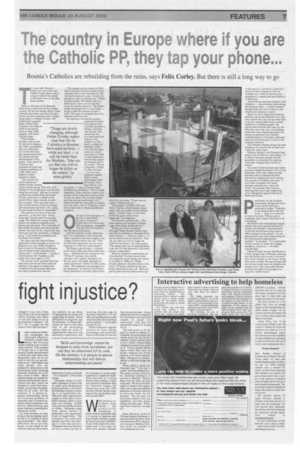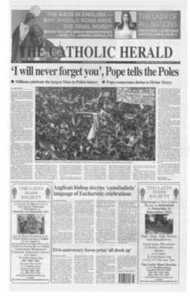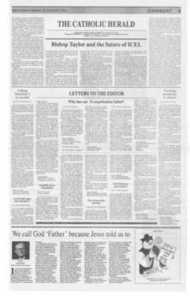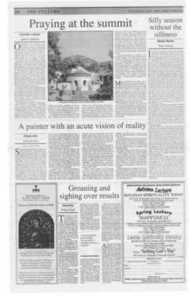Page 7, 23rd August 2002
Page 7

Report an error
Noticed an error on this page?If you've noticed an error in this article please click here to report it.
Tags
Share
Related articles
Can This Man Heal The Red Wounds Of Sarajevo?
Mostar: Where Hope Still Burns
Cleansing Bosnia Of Its Catholic Influence
Why War Has Broken All
Papal Visit Heartens Embattled Catholics Of Serb-run Bosnia
The country in Europe where if you are the Catholic PP, they tap your phone...
Ten years after Bosnia's brutal civil war broke out, Father Zvonko Brezovski is trying to rebuild his parish in the north west of the shattered country.
Sadly, in this part of the Bosnian Serb entity in the north of the divided country, life for the mainly ethnic Croat Catholics has been very hard. But few priests can have inherited such a frightening legacy as Father Zvonko. His predecessor as parish priest, Father Filip Lukenda, was burnt to death in the parish house in May 1995, together with Sister Cecilija Grgic.
When Father Zvonko, who is now 29, arrived in September 1998, immediately after his ordination, he was the first resident parish priest after the murder and the abandonment of the parish. Only about 90 Catholics had remained of a pre-war Catholic population of 2,500. Most were elderly or were married to Serbs.
"The church was totally destroyed," Father Zvonko recalls, "burnt and blown up. The relic of St Therese of the Child Jesus was the only thing that survived." He says it was no accident that Father Filip and Sister Cecilija were burnt to death in the parish office, where church records were housed. "This was their plan they would destroy all the documents and monuments and after a few years no-one would be there to remember."
This process was soon to become notorious, as the new term "ethnic cleansing" became part of everyday usage. The death toll among Catholic priests and religious totalled seven priests and one sister. "For Catholics, if they killed the priest and destroyed the church, the heart of the community was destroyed and the community would go away. 'I will strike the shepherd and the sheep will scatter'."
Six years after the Dayton Peace Agreement which brought an end to the Bosnian civil war, Father Zvonko is hard at work in his parish of Presnace close to Banja Luka, rebuilding the church and — much harder — trying to rebuild parish life. Numbers in the parish have risen again to 250.
The church's new concrete floor has been laid, and the red brick walls are starting to rise again to replace the twisted and burnt remains that have now been cleared from the site. "We cleared out the church in 2001, first of all removing the chunks of the concrete pillars that had fallen in. The roof had completely gone. It took five months to clear everything out," Father Zvonko recalls. His father, who is a brick layer, came over to help and many lay people joined in. "My father taught our people how to lay bricks he gave them the chance to learn a skill." He hopes to complete the walls and new roof this year.
He expresses his and the people's gratitude for finan cial support from Catholic parishes in Britain, Germany and Austria. One parish that has provided particular support is St Joseph's in Tilehurst, a suburb of Reading, which over the past three years has raised more than £11,000 to help rebuild the church and support aid projects run by the parish. "This is a big help," Father Zvonko declares.
And not only financial support. Half a dozen parishioners from St Joseph's have been able to visit his parish — some of them to help refurbish the presbytery. "This is really important, when someone comes to be present. Every time they come we feel we are not alone. This is more important than having something to eat." Father Zvonko has been able to cement ties with three visits to Tilehurst, where he has been able to thank parishioners in person.
0 ne sign of the sad legacy of the war is that Father Zvonko is building a church that will house only 300 worshippers, compared with the 500 who could fit into the destroyed church.
Until the church is ready, Mass has had to be celebrated in the classroom where catechism had been taught to the village children before the war. "This too had been destroyed, but we reconstructed it in 1999 as a small chapel."
The Banja Luka diocese — located in the heart of Bosnian Serb-ruled territory — suffered heavily during the war. "Of the 57 parishes, four parish churches were slightly damaged, but the rest were very badly damaged or totally destroyed," Father Zvonko notes sadly. "The cathedral was damaged but not destroyed." In addition, his bishop Franjo Komarica was held under house arrest for two years. "There was no public Catholic activity."
The murders of Father Filip and Sister Cecilija, which remain unpunished, still cast a pall over the atmosphere. "I believe many of the local Serbs feel guilty about what happened," he maintains.
The Muslims suffered also. "The three famous old mosques in Banja Luka were totally destroyed too."
Things are slowly changing, although Father Zvonko makes clear that life for Catholics in Bosnian Serbruled territory — while not ideal -is still far better than for Muslims. "One can say that you will no longer be killed on the streets," he notes grimly. "The dream they had of keeping Banja Luka just for one nationality and ethnic group is impossible."
Minority religious communities are "not allowed" to work outside their own premises and building new places of worship is "difficult". Father Zvonko points to the difficulties in the town of Prijedor rebuilding the presbytery destroyed in the war. "Both the parish priest and the bishop had to go to the mayor to ask him to intervene." And, he notes, telephone calls are listened into, while all church correspondence is opened and read before it is delivered.
And relations between Catholics and Orthodox — the dominant faith among the Bosnian Serbs — remain strained, though Father Zvonko is keen to see ecumenical relations to grow.
However, he is happy that Catholic parishes can at least function now and, since earlier this year, he has been able to go into school after hours to teach catechism to Catholic pupils. He reports that at Easter this year, for the first time since the war, a local Banja Luka television channel devoted a 40minute programme to a Catholic commemoration of the feast, although state-run television gave it only a onesentence mention.
The Orthodox Easter liturgy has been broadcast live and in full on state television for some years.
Political change in the Bosnian Serb entity will, he believes, take longer. "It is always the same people who are presented to the people for election. Until that changes there will be no future."
At a time of mass poverty and unemployment blighting people's lives in the aftermath of the war, Father Zvonko has been able to channel aid from abroad into helping the local community, people of all faiths and none. "I have been occupied with seeds, animals, greenhouses, water and roads," he recounts. His work on restoring the local water supply has won widespread support from local Serbs and Croats.
particularly for the Catholic community, though not exclusively, he has become a community leader. "Catholics in my diocese have only the priest — there is no-one else to turn to for help. Without active laypeople, they expect the priest to do everything."
He believes the international organisations who have poured millions of pounds into Bosnia's reconstruction could and should have done more to effect change on the ground. "In one year Caritas built more houses than all the international organisations together," he declares. "It is impossible for the country to make the changes needed by ourselves — we need outside help."
Father Zvonko stresses that Bosnia is a fully-fledged part of Europe, pointing out that Banja Luka is only a two-hour drive from Austria or two hours' flying time from London. He says Europe and the outside world must not abandon the country now. "Six years after Dayton we have the right to see progress, to hope for a better future."
blog comments powered by Disqus















